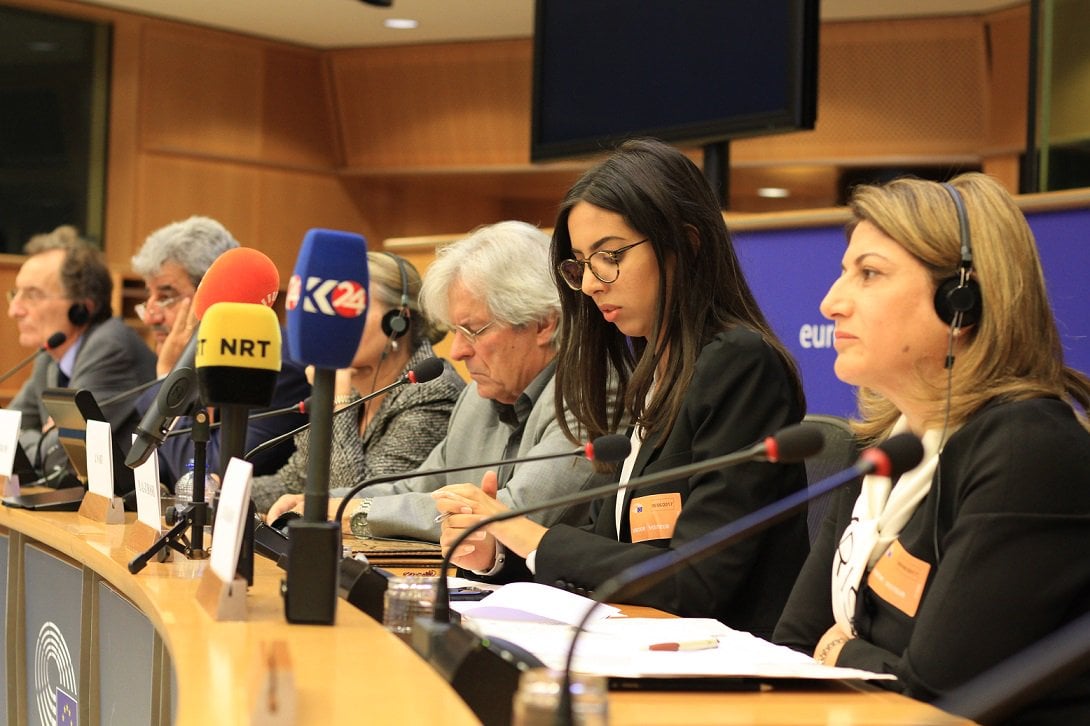
Iraqis, Europeans Press for Support for Post-ISIS Transition
Brussels – 7 June 2017 – A conference organized to discuss the shape of Post-ISIS Iraq concluded with consensus on a broad array of steps to return displaced persons to their homes and rebuild. Noting that the impending fall of Mosul does not signify “Game Over” for European Union institutions and member states, the conference developed seven major options for Europe and Iraqi authorities for the “Post-ISIS” phase of the conflict in Iraq. As Conference Keynoter Adama Dieng, representing the UN Secretary General, noted “peace begins with peace of mind.”
This conference, convened at the European Parliament, included senior representatives of the Iraqi government, the Kurdish Region, the United Nations, European Union institutions, Iraqi and European parliamentarians, and Iraqi and international civil society representatives.
“We cannot wait. We have to start the process now,” noted Conference Co-Chair and MEP Ana Gomes. In a chairman’s statement, Gomes and her fellow co-chair MEP Elmar Brok identified seven main priorities:
- There is a clear need to ensure that returns to retaken areas are dignified, safe and voluntary. Representatives present at the conference agreed to define security arrangements in affected areas, working to ensure that security forces are accepted by local populations, affirming that the people of retaken areas have the right to determine their political and security future, and reintegrating Popular Mobilization Units into Iraqi security structures.
- Ensure freedom of movement for people and relief and reconstruction assistance in retaken areas.
- Participants affirmed that accountability for crimes is a critical part of the Post-ISIS era. Iraqi government representatives (including the Kurdish Region) recognized the need to develop a national strategy to address violations of international humanitarian and criminal law for all perpetrators, and identify appropriate international and domestic resources. Other organizations underscored the urgent need for commitments from Iraqi authorities on accountability, including accepting the jurisdiction of the International Criminal Court. Because ISIS is a global phenomenon that requires a global response, the United Nations should also have a leading role. Participants called on the European Union to ensure the funding and implementation of an accountability mechanism to collect, preserve and analyse evidence.
- Iraq will protect its diversity. Iraqi authorities (including the Kurdish Region) at the meeting agreed to respond to the needs of Iraq’s ethnic and religious minorities by promulgating and implementing legislation and take other measures to safeguard religious and other rights and pursue decentralization as necessary.
- Responding to the humanitarian crisis is an immediate priority. On an urgent basis, participants called on Iraqi authorities (including the Kurdish Region) to provide life-saving assistance to all persons in need and call upon donors to fully fund the Humanitarian Response Plan prepared by the UN and its partners.
- Reconstruction should be accelerated where possible.
- Efforts should be focused on protecting the most vulnerable. Participants called on Iraqi authorities, EU institutions and member states to prioritize humanitarian and reconstruction assistance for those most vulnerable, including minority groups, women and children based on assessed needs.
The conference chairs concluded that European Union diplomacy, mechanisms and resources should be better channeled to support implementation of these recommendations. The full statement can be downloaded at http://tinyurl.com/StatementoftheChair.
The conference took place to coincide with the impending liberation of Mosul, and was designed to follow up the Paris Action Plan presented of September 2015 at the International Conference on the Victims of Ethnic and Religious Violence in the Middle East convened in Paris, and its Madrid follow up meeting, held on 24 May 2017.
“This conference was convened on the third anniversary of the fall of Mosul, and sadly over the past three years there has not been systematic, open discussion of options to enable returns and rebuild in the Post-ISIS era,” said Institute for International Law and Human Rights Executive Director William Spence Spencer. “As a result, some minority groups fear the peace even more than the war. And we must allay these fears immediately.”
The Conference was organized by the Institute for International Law and Human Rights, Minority Rights Group International, No Peace Without Justice, the Unrepresented Nations and Peoples Organization, and the Konrad Adenauer Stiftung.
Download a copy of the press release here PostISISconferencestatement final